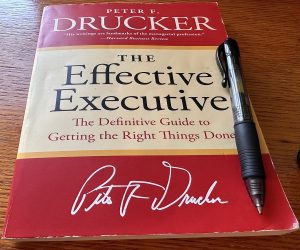For Master Leadership and Productivity
1. “Effectiveness is a habit; that is, a complex of practices.”
- Significance: Drucker emphasizes that effectiveness isn’t an innate trait but a skill that can be learned and developed. It involves deliberate practice, habits, and systematic behaviors that enhance productivity.
2. “The effective executive focuses on contribution.”
- Significance: This quote highlights the need for executives to prioritize results that benefit the organization and its goals. Instead of being preoccupied with personal achievements, they should ask, What can I contribute that will significantly impact the organization?
3. “Know thy time.”
- Significance: Time management is foundational to effectiveness. Drucker stresses the importance of understanding where your time goes and ensuring it is spent on high-value activities. He advises leaders to eliminate time-wasting activities and allocate their time to priorities.
4. “What is the contribution I should make?”
- Significance: This question underscores a results-oriented approach. Drucker urges executives to think in terms of their unique contributions to the organization, aligning their skills with the organization’s needs and goals.
5. “Making good decisions is a crucial skill at every level.”
- Significance: Decision-making is central to the role of an executive. Drucker outlines that effective decisions require a process: understanding the problem, analyzing alternatives, and committing to the best solution.
6. “Do first things first—and second things not at all.”
- Significance: Prioritization is a key principle of effectiveness. Executives should identify the most important tasks and focus their energy on completing them. Non-essential tasks should be avoided to prevent distractions.
7. “The greatest wisdom not applied to action and behavior is meaningless data.”
- Significance: Knowledge alone does not lead to results unless it is applied. Effective executives convert insights into actionable steps that produce tangible outcomes.
8. “Effective executives do not make a great many decisions. They concentrate on the important ones.”
- Significance: This quote stresses the importance of quality over quantity in decision-making. Focusing on fewer, high-impact decisions allows executives to maximize their influence.
9. “If there is any one ‘secret’ of effectiveness, it is concentration.”
- Significance: Drucker highlights concentration as a critical skill for executives. By channeling energy and focus into a single task or objective at a time, leaders can achieve better results.
10. “The effective executive does not rise to the level of his incompetence.”
- Significance: This idea, closely related to the “Peter Principle,” suggests that effective leaders recognize their strengths and limitations. They avoid taking on roles or responsibilities where they are unlikely to succeed.
11. “Work on opportunities, not problems.”
- Significance: Drucker advises executives to focus on opportunities for growth rather than merely solving problems. While problems need resolution, opportunities drive innovation and progress.
12. “It is more productive to convert an opportunity into results than to solve a problem—which only restores the equilibrium of yesterday.”
- Significance: This quote builds on the idea of opportunity focus. Addressing opportunities creates forward momentum, whereas solving problems merely maintains the status quo.
13. “The effective executive builds on strengths—their own strengths, the strengths of superiors, colleagues, and subordinates; and on the strengths in the situation.”
- Significance: By leveraging strengths rather than focusing on weaknesses, executives can achieve higher performance and foster a more positive and productive environment.
14. “Meetings are by definition a concession to deficient organization.”
- Significance: Drucker criticizes poorly planned or unnecessary meetings as a waste of time. Effective executives ensure meetings are purposeful, structured, and productive.
15. “The less an organization has to do to produce results, the better.”
- Significance: Drucker advocates for simplicity and efficiency. Over-complication and excessive activities can dilute focus and diminish effectiveness.
16. “Executives are not paid for doing things they like to do. They are paid for getting the right things done.”
- Significance: This quote reinforces the need for discipline and accountability. Executives must prioritize organizational goals over personal preferences.
Conclusion:
Drucker’s The Effective Executive is a timeless guide that teaches how to focus on results, manage time effectively, and develop habits of high-impact leadership. These quotes encapsulate the essence of the book, reminding us that effectiveness is a practice that anyone can cultivate through deliberate effort.
Check Amazon For Buy This Book

